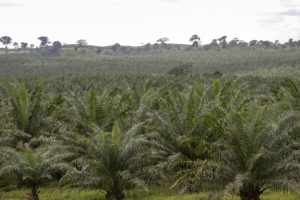#environmentprotection #traceability #cocoa
Posted: 13 March 2021
Related core topics: Business news, Cocoa & chocolate, Processing, Sustainability
Related organisations: Earthworm Foundation, Godiva, nestle
Related people: Carmen Wandja
Related regions: Ivory Coast, worldwide
The Earthworm Foundation non-profit organisation has joined a key Ivory Coast palm oil and cocoa project with Nestlé, Godiva, Pro Fair Trade and SIPEF-CI (Société Internationale de Plantations et de Finances – Côte d’Ivoire), writes Neill Barston.
As the organisation explained, it is working with smallholder farmers in Soubré – capital of the Nawa region in south-west of the country, to ensure sustainable practices are carried out by the country’s agricultural industry.
According to Earthworm in Soubré, 69 percent of cocoa plantations are between two and five hectares. Eighty-five percent of oil palm plantations are between one and five hectares. This means that most cocoa bean and oil palm production is in the hands of smallholders, who inadvertently put pressure on soils and natural resources.
This in turn negatively affects natural and protected areas, with concerns having previously been raised that historic problems relating to demarcating land ownership have impacted on efforts to protect key forest areas.
Significantly, Soubré has a single palm oil production plant – the SIPEF-CI. This is where all 3,353 smallholders in the area deliver their produce. They supply 60 percent of the palm fruit delivered to SIPEF-CI.
Since 2015, SIPEF-CI has begun the RSPO (Roundtable on Sustainable Palm Oil) certification process to adhere to international sustainability standards. This commitment requires them to reconcile the drive for high production quantities with environmental considerations and respecting the rights of local communities.
“We need to produce our palm oil in a way that is considerate of people living here; as the plantations are directly set in their villages. Our activities shouldn’t negatively impact the social and environmental well-being of the population,” said Carmen Wandja, who is in charge of implementing RSPO standards at SIPEF-CI.
This isn’t always easy, as smallholders face challenges with financial independence and food security. It is therefore necessary to provide them with technical assistance to improve their resilience.
Rurality – Eathworm’s farmer resilience programme – was launched in Ivory Coast with financial support from Nestlé and Pro Fair Trade. It is founded upon the three pillars of traceability, improving producers’ quality of life and protection of the environment. As the group behind the venture explained, Nestlé played a strong funding role for the initiative over several years, its direct financial involvement ceased at the end of 2020, with Godiva now driving its developments into 2021.
Traceability is a requirement in the palm oil supply chain, aiming to reveal the path of the product. This way, the processing plant can be certain that the product does not come from sensitive conservation areas. It can also improve its services towards the smallholders.
Mapping plantations is an important step in establishing traceability, “giving the processing plant the necessary information to identify producers and better organise its supply chain,” explained Zotahon, Earthworm’s field technician.
Since early January 2021, over 4,000 plantations – the entire supply chain of SIPEF-CI’s Ottawa plant – have been geo-referenced. Nine hundred thirty plantation boundaries have also been mapped by the Earthworm team in collaboration with coordinators from SIPEF-CI and cooperatives.

The traceability work was accompanied by support for producers to improve their livelihoods. To date, more than 1257 farming families have benefited from this.
Improving the quality of the environment and forests
As Earthworm noted, Soubré region is full of protected areas threatened by agriculture.
“We have the Tai National Park which is to the west, the classified forest of Niégré to the south-east, the classified forest of the Grah Rapids to the south and north, the classified forest of the Kourabayi mountains. These forests are infiltrated a lot by cocoa producers,” explained Eléonore N’Gbesso Tanoh, who leads our work with farmers in Ivory Coast.
With financial support from Godiva, Earthworm’s field team is helping farmers introduce trees in cocoa plantations located inside the classified forests of the Kourabayi and Niégré mountains. Outside the forests, the team encourages cocoa farmers to plant forest tree species in their plantations.
Furthermore, Earthworm highlighted the case of Issouf Diarrassouba and Amara Bakouan, who are both farmers who plant cocoa and oil palm. After meeting with the Earthworm field team, they decided to practice agroforestry on their cocoa farms.
Diarrassouba is in the early stages but remains hopeful that agroforestry will benefit his plantation. Amara has been practicing agroforestry since 2014. Two of his neighbors have followed suit.
To convince as many growers as possible to practice agroforestry, Earthworm is working with the state forest management agency, SODEFOR (Société de Développement des Forêts de Côte d’Ivoire). This involves mass sensitization of communities living in the Kourabahi Mountains and Niégré forest reserves. The idea going forward is to create village committees for reforestation and preserving forest relics.


Comments are closed.